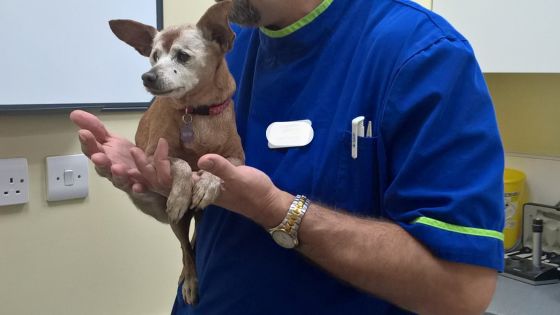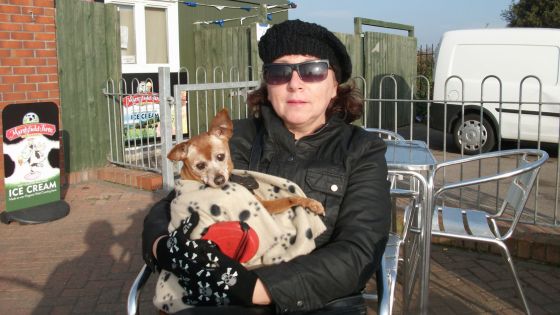Recognizing Signs of Illness in Senior Dogs
As our beloved canine companions age, they may start showing signs of illness that require our attention and care. Symptoms such as lethargy, loss of appetite, weight loss, increased drinking, peeing more and changes in behavior can indicate underlying health issues in senior dogs. It is crucial to be observant of these signs and seek veterinary advice promptly.
Seeking Professional Veterinary Care

When your senior dog is unwell, it is essential to consult a veterinarian for a proper diagnosis and treatment plan. Veterinarians are trained to assess the health of senior dogs and recommend appropriate medical interventions to improve their well-being. Regular check-ups and open communication with your vet are key in supporting your senior dog’s health.
You know your dog best and if you feel something is wrong, even if you can’t put your finger on what exactly it is, please see your vet and make sure he or she takes you seriously. Unfortunately, not all vets see value in senior dogs, and I know that from my own experience as well as the experience of many members of my FB group, Senior Dog Care Club.
If you vet dismisses your concerns, or gives you a diagnosis of “it’s old age” without even conducting one test, I recommend you run quickly and find yourself another vet. That attitude could put your senior dog’s life at risk.
Providing Comfort and Support

During times of illness, senior dogs need extra care and attention to help them feel comfortable and supported. Creating a cozy and quiet space for your furry friend, offering them nutritious meals, and administering medications as prescribed by the vet are ways to show your support during their recovery.
Understanding End-of-Life Care
As senior dogs age, it is important to consider end-of-life care options that prioritize their comfort and quality of life. Discussing these options with your vet and making informed decisions about pain management, hospice care, or euthanasia can help ensure a peaceful transition for your beloved senior dog.
I know this is a topic none of us want to talk about, but it’s important. I never talked about it or thought about it, and then I’m standing in the vet’s office with my first pet, a cat named Calypso and listening to the vet go through the horrible test results and how there’s nothing they can do.
The next thing I know I’m given a form to sign with the word euthanasia in huge letters across the top, and my vet asking what I want to do with her ashes. I knew I wanted them back (at least I knew that much!) so I was handed a catalogue of urns to choose from.
I know it sounds gruesome but my vet couldn’t have been nicer, it was just so overwhelming because I had no idea about any of this.
All I’m saying is, pretending these issues aren’t real can cause you to make decisions you regret later. Even thinking about it doesn’t guarantee that the answers will come quickly when faced with these situations, but it does mean we’ve taken the time to consider things calmly, not when panicked or under pressure.
Embracing the Journey Together

Supporting a senior dog through illness can be a challenging yet rewarding experience. By being attentive to their needs, seeking professional veterinary care, and providing comfort and support, you can make a positive impact on your furry friend’s quality of life during their golden years. Remember that your love and companionship are invaluable in helping your senior dog navigate through illness with grace and dignity.
If you’re looking for a community of senior dog parents, a place where you can find helpful tips, support and people who “get it” please join my FB group Senior Dog Care Club
I’m excited to announce my new Senior Dog Care Support Service.
I offer 1:1 support on everything from health & wellness advice and training tips, to preparing to say goodbye and grief counselling. You can find details on all the packages I offer by visiting the Senior Dog Care Support Service page. If you have any questions or would like to book your FREE 15 minute chat, please email hpearson141@gmail.com
I’ve been rescuing and caring for senior dogs since 2009. From vision and hearing loss to obesity, dementia, kidney disease, liver issues, cardiac problems, Cushing’s, mobility challenges and more, you could say I’ve dealt with and learned a lot! In addition to my hands on experience, I’ve taken many courses and earned several qualifications to keep learning how to help senior dogs and they include: Senior Dog Enrichment, Understanding Canine Anxiety, Care of the Senior Pet and I’m a Certified Pet Loss Specialist.

Super post, Hindy! You are right thinking about the stuff you don’t want to think about is essential. Each time with my fur kids the end was a bit surprising for everyone. I remember a few years after my mom was diagnosed with Parkinson’s’, I decided we should think about the end and plan that so we wouldn’t have to deal with it in grief. Mom wasn’t on board with that idea. So, did as much as possible. She filled in the pieces in the last few days. It’s kind of funny that we can plan ahead for the end of our earthly life with pre-funeral planning, living trusts, and wills. Yet, we don’t do this for those we are often closest to – our fur kids. You’ve given me much to think about in this article. Thank you! I’m sharing with all my pet parents.
Thanks so much Terri. It’s definitely a tough subject to think about, but after my first experience saying goodbye I learned how important it is to at least give it some thought. I’m sorry to hear about your mom, and as difficult as it must have been you were right to start the conversation. I’ve made no plans for myself, I guess that’s because we can’t accept the fact we won’t live forever.
Great post as I have just been through it all and I got a second opinion as I was not happy with my vet of 13 years but I still feel I let her down. The vet that helped her cross over was amazing and I did it at my home and they brought her ashes to me. It is not easy but I am at peace that she is not suffering anymore.
You were so right to get a second opinion, and I’m sorry your long time vet didn’t offer you the help and support you needed at such a crucial time. It much have been so much better for Layla to have someone come to your home, and for you to experience such compassion when you needed it most. You never let her down, you did such a great job of caring for Layla.
Such an important post. Having five Huskies, all who were young pups when we brought them home, we knew one day *in the far future* we would have to face losing them all around the same time, and what a horrendous heartbreak that would be. But, they were young and I didn’t have to worry about that….yet. Then, as time does, it rolls by and suddely, we were looking down the barrel of losing our first one, then each one after (although a couple were total shocks)…having a plan in place is so key. This post is great as so many of us doting pet parents don’t want to visit this topic, but we need to. Just having a plan, even if it is just in our minds, truly helps.
I really am so happy you talked about having a good vet and working with them for the best possible plan. I was very fortunate that I had a wonderful team, and they became friends, but always delivered the honest truth to me, and I trusted them, and they always listened to my “Could we try…” statements and joined me in doing something alternative.
All that said, it’s still the most heartbreaking time for pet parents. But at least with a plan in place, we can know we did the very best. Great post, Hindy.
I can’t imagine how hard it was, knowing your pups were close in age and you may face a big loss too close together. I remember two of my cats dying within 6 weeks of each other. They weren’t related, one was 11 and one was 16 but both died from kidney disease. You’re right when you say, even having the semblance of a plan in our mind can be a huge help. You’re also lucky to have had such a good vet to support you on your journey. One of the reasons I started my FB group was my concern that not everyone had that kind of support.